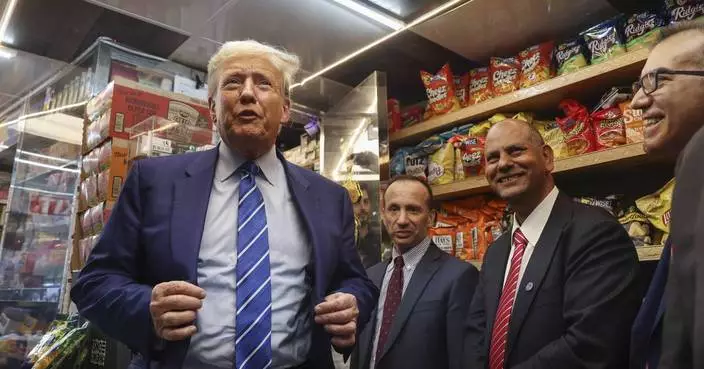Two former Las Vegas trade show workers have pleaded guilty to federal firearms charges in the theft of weapons from the U.S. gun industry's biggest annual convention last January.
Forklift operator Jamikko Foster could face about four years in prison and co-worker Eduardo Limon faces around three years, according to plea agreements filed Thursday in U.S. District Court in Las Vegas.
Limon's attorney, Chris Rasmussen, said Friday he'll ask a judge to spare his client any more time in custody. Limon, 28, pleaded guilty to the two charges he faced: possession of a stolen firearm and possession of an unregistered firearm.
Authorities recovered all the more than 60 pistols, rifles, machine guns and silencers stolen from the National Shooting Sports Foundation's "Shooting, Hunting, Outdoor Trade" show, Rasmussen said.
Foster, 27, pleaded guilty to firearms theft and unlawful possession of a machine gun. He had faced four weapons counts carrying a combined possible sentence of 40 years in prison and a $1 million fine.
Foster's federal public defender, Heidi Ojeda, didn't immediately respond to telephone and email messages.
Foster and Limon were arrested in February after a Nevada gun shop owner reported that a customer asked him how he could obtain a firing pin for an assault-style rifle. The National Shooting Sports Foundation requires SHOT show display weapons to be disabled by having firing pins removed.
After a trade show inventory revealed that weapons were missing, the federal Bureau of Alcohol, Tobacco, Firearms and Explosives notified licensed gun store owners to report people seeking gunsmith services, according to court documents.
ATF agents and Las Vegas police identified Limon by store receipts and Foster as the owner of a black Chevrolet Impala seen on store parking lot video, documents said.
"This shows the quick reaction and cooperation between industry, retail and law enforcement to deter these kinds of crimes," foundation spokesman Mark Oliva said Friday.
Oliva called the theft of weapons from the SHOT show a first in his memory. He declined to specify whether policies will change for the 2020 event held at the sprawling Sands Expo center adjacent to the Venetian and Palazzo resorts.
The show, entering its 41st year, is restricted to industry members. It draws about 1,700 exhibitors and more than 60,000 attendees.
This story corrects the name of SHOT show host National Shooting Sports Foundation, not Federation.
WASHINGTON (AP) — The United States on Wednesday imposed new sanctions on hundreds of companies and people tied to Russia's weapons development program, more than a dozen Chinese entities accused of helping Moscow find workarounds to earlier penalties, and individuals linked to the death of Kremlin opposition leader Alexei Navalny.
The actions by the departments of Treasury and State target Russia’s military-industrial base, chemical weapons programs and people and companies in third countries that help Russia acquire weapons components as its invasion of Ukraine has entered its third year.
Treasury Secretary Janet Yellen said the action “will further disrupt and degrade Russia’s war efforts by going after its military industrial base and the evasion networks that help supply it.”
The Senate, meanwhile, gave final approval to legislation barring imports of Russian uranium, boosting U.S. efforts to disrupt Russia’s war in Ukraine. Democratic President Joe Biden is expected to sign the bill into law.
About 12% of the uranium used to produce electricity at U.S. nuclear power plants is imported from Russia, according to the U.S. Energy Information Administration.
A spokesperson for the National Security Council said Wednesday that Biden shares lawmakers’ concerns about U.S. reliance on Russia for low-enriched uranium to support its domestic nuclear fleet.
Included in the administration's announcement are importers of cotton cellulose and nitrocellulose, which are used to produce gunpowder, rocket propellants and other explosives. The penalties also target Russian government entities and people tied to Russia's chemical and biological weapons programs, companies related to Russia's natural gas construction projects and three workers at the penal colony where Navalny died.
Russian President Vladimir Putin has railed against earlier rounds of U.S. and Western penalties, claiming they are “illegitimate sanctions” on his country.
A group of 16 targets in China and Hong Kong, most of which are related to Russian procurement workarounds, are named by the Biden administration.
Yellen traveled to Guangzhou and Beijing last month to warn Chinese officials that they “must not provide material support for Russia’s war and that they will face significant consequences if they do."
China has said it is not providing Russia with arms or military assistance, although Beijing has maintained robust economic connections with Moscow, alongside India and other countries, as the West imposes sanctions.
Companies in China, Azerbaijan, Belgium, Slovakia, Turkey and the United Arab Emirates were accused of helping Russia acquire technology and equipment from abroad. The penalties aim to block them from using the U.S. financial system and bar American citizens from dealing with them.
Biden last week said he would immediately rush badly needed weaponry to Ukraine as he signed into law a $95 billion war aid measure that also included assistance for Israel, Taiwan and other global hot spots.
The upcoming uranium ban is also expected to impact Russian revenues by at least $1 billion. The U.S. banned Russian oil imports after Russia invaded Ukraine in early 2022 but did not against uranium, despite frequent calls to do so by U.S. lawmakers in both parties.
Wyoming Sen. John Barrasso, the top Republican on the Senate Energy and Natural Resources Committee, called the import ban “a tremendous victory” and said it “will help defund Russia’s war machine, revive American uranium production and jumpstart investments in America’s nuclear fuel supply chain.″
“Wyoming has the uranium to replace Russian imports, and we’re ready to use it,″ Barrasso added.
West Virginia Sen. Joe Manchin, a Democrat who heads that Senate committee, said it was "unconscionable” for the U.S. to help make it possible for Putin to “finance his unlawful war against Ukraine” through U.S. reliance on Russian uranium.
Besides the import ban, the legislation frees up $2.7 billion in previously authorized funding to ramp up domestic uranium production.

FILE- This June 6, 2019, file photo shows the U.S. Treasury Department building at dusk in Washington. The United States has imposed new sanctions on hundreds of firms and people tied to Russia’s weapons development program, more than a dozen Chinese firms accused of helping Russia find workarounds to sanctions and individuals tied to the death of Russian dissident Alexey Navalny. The sanctions imposed Wednesday by the Treasury and State departments target Russia’s military-industrial base, chemical weapons programs and people and firms in third countries that help Russia acquire weapons components as its invasion of Ukraine has entered its third year. (AP Photo/Patrick Semansky, File)










